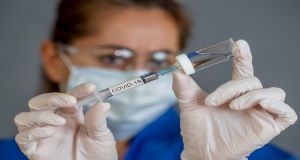COVID-19 Vaccines
COVID-19 mRNA vaccines and heart inflammation events
5 min read
By Apollo 24/7, Published on - 29 June 2021, Updated on - 18 October 2022
Share this article
2
73 likes

Recently, the United States Food and Drug Administration (US FDA) announced that it is revising the patient and healthcare provider factsheets of Pfizer and Moderna’s mRNA COVID-19. The decision to change the literature of these vaccines has been taken after an extensive review of reports by the Centers for Disease Control and Prevention (CDC). The review has noted a rare risk of heart inflammation in people vaccinated with mRNA vaccines.
The Indian government is reportedly negotiating the purchase of mRNA vaccines made by Pfizer and Moderna to boost its COVID-19 vaccination program. Therefore, it is only natural for people to have questions and concerns about the link between heart inflammation and the mRNA COVID-19 vaccines.
Cases of heart inflammation in vaccinated US population
In the United States, more than 153 million people have received both doses of either Pfizer or Moderna vaccine as of June 2021. Of these, 1200 people have reported experiencing heart problems after vaccination. According to the US Vaccine Adverse Event Reporting System (VAERS), 616 reports of heart inflammation involving myocarditis and pericarditis in people aged 30 years and younger after mRNA COVID-19 vaccination, have been received.
A follow-up by CDC and FDA has confirmed 393 of these cases. In most instances, myocarditis and pericarditis occurred within a week after the second dose of the vaccines. The CDC review has noted a higher incidence of heart inflammation in male adolescents and young adults aged 16 years and above.
Everything you need to know about myocarditis and pericarditis
What is myocarditis?
Myocarditis is a cardiac disease that is characterized by the inflammation of the myocardium (heart muscle). The myocardium plays a major role in the circulatory system of the body. During the cardiac cycle, the muscle relaxes to fill the heart valves with blood (diastole) and then contracts to pump the blood (systole) to the rest of the body.
Inflammation of the myocardium can impair the ability of the heart to pump blood effectively. In extreme cases, myocarditis can weaken the heart so much that it cannot supply enough blood to the body. This can cause severe blood clotting, resulting in a heart attack, stroke, or heart failure.
The potential causes of myocarditis include viral, bacterial, and fungal infections. However, it can also be triggered by an immune reaction to a drug or other inflammatory diseases.
Symptoms of myocarditis
In cases involving mild myocarditis, a person may not experience any symptoms. However, when symptoms do occur, they mostly comprise the following:
- Fatigue
- Chest pain
- Headache
- Diarrhoea
- Sore throat
- Body pain
- Shortness of breath
- Swelling in legs, ankles, and feet
- Abnormal heartbeat (arrhythmias)
In many cases, myocarditis resolves on its own without necessitating treatment. It may never lead to sudden symptoms associated with heart failure. Nevertheless, there is always a risk that the condition may damage the cardiac muscle over time.
Diagnosis and treatment of myocarditis
Myocarditis is usually detected with the help of diagnostic tests such as chest X-ray, electrocardiogram (ECG), magnetic resonance imaging (MRI), echocardiogram, cardiac catheterization, and endomyocardial biopsy.
Medications such as Angiotensin-converting enzyme (ACE) inhibitors, Angiotensin II receptor blockers (ARBs), beta-blockers, antibiotic therapy, corticosteroids, or diuretics may be prescribed by the doctor to treat myocarditis. In severe cases, treatments such as intravenous (IV) medications, intra-aortic balloon pumps, ventricular assist devices, or extracorporeal membrane oxygenation (ECMO) may be needed.
What is pericarditis?
Pericarditis is a cardiac condition that is marked by the inflammation of the pericardium (a thin, two-layered, fluid-filled sac that envelopes the heart’s outer surface). The role of the pericardium is to lubricate the heart and protect it from infection. It is also responsible for preventing the over-expansion of the heart when blood volume increases and maintaining its position inside the chest wall.
In pericarditis, the membrane of the heart (pericardium) experiences redness, swelling, and irritation. The condition causes sharp pain in the chest which mostly occurs when the inflamed layers of the pericardium brush against each other. It is usually acute and lasts for a few months. However, in some cases, it may occur intermittently over many years.
The causes of pericarditis include infection, chest injury, heart attack, heart surgery, inflammatory disorders like lupus, scleroderma, rheumatoid arthritis, etc. In most cases, pericarditis is mild and subsides on its own without requiring treatment. Nevertheless, in severe cases, the condition requires treatment, including medication and surgery.
Symptoms of pericarditis
The most common symptom of pericarditis is a pain in the middle or left side of the chest, behind the breastbone. Some people with pericarditis may even experience pain in their shoulders, neck, arms, or jaw. The intensity of chest pain can vary from sharp to dull. The pain can worsen while coughing, lying down, or breathing deeply. On the other hand, sitting up and leaning forward can offer short-term relief from the pain.
Other symptoms of pericarditis include:
- Dry Cough
- Low fever
- Heart palpitations
- Shortness of breath
- Fatigue or weakness
- Swelling in legs, feet, or ankles.
Diagnosis and treatment of pericarditis
Some of the tests that a doctor may conduct to diagnose pericarditis include blood tests, chest X-ray, echocardiogram, ECG, cardiac MRI, and cardiac computerized tomography (CT) scan.
People with mild pericarditis usually get better without treatment. In other cases, medications such as OTC pain relievers (aspirin or ibuprofen), colchicine, or corticosteroids may be prescribed. Surgical treatments such as pericardiocentesis or pericardiectomy may be necessary in cases involving fluid buildup around the heart.
Are mRNA COVID-19 vaccines safe?
Experts say that mRNA COVID-19 vaccines are safe. According to CDC data, the risk of heart inflammation after mRNA COVID-19 vaccination is extremely small - just 12.6 cases per million second doses administered have been reported so far. The majority of the confirmed cases exhibited mild symptoms which subsided rather quickly. Researchers say that getting COVID-19 is associated with a greater risk of heart inflammation than receiving mRNA vaccines. Therefore, the benefits of mRNA vaccination outweigh any potential risks.
Nevertheless, doctors in the United States have been advised to be on the lookout for heart issues in adolescents and young adults exhibiting symptoms such as chest pain, shortness of breath, and abnormal heart rhythms after mRNA COVID-19 vaccination. Vaccine recipients have been advised to seek immediate medical attention if they experience any of the above-mentioned symptoms.
If you have any questions on the Coronavirus, you can speak to our experts through an online doctor consultation.
For any questions related to heart health, you can talk to a cardiologist.
COVID-19 Vaccines
Leave Comment
Recommended for you

COVID-19 Vaccines
Debunking COVID-19 Vaccine Myths with Facts
The apprehensions and fears about COVID-19 vaccines have been fueled to a great extent by the myths and misconceptions circulating on social media.

COVID-19 Vaccines
The Benefits of Getting a COVID-19 Vaccine
While the vast majority of our country is waiting eagerly in anticipation of getting a vaccine, there are a few who are either unwilling or unsure about getting vaccinated.

COVID-19 Vaccines
Can a Vaccine Provide Better Immunity than Natural Infection?
Some people believe that naturally acquired immunity is better than the immunity provided by vaccines. According to the CDC, natural infections can sometimes lead to serious complications.
Subscribe
Sign up for our free Health Library Daily Newsletter
Get doctor-approved health tips, news, and more.
Visual Stories

COVID-19 Vaccine Factbox: Oxford/AstraZeneca
Tap to continue exploring
Recommended for you

COVID-19 Vaccines
Debunking COVID-19 Vaccine Myths with Facts
The apprehensions and fears about COVID-19 vaccines have been fueled to a great extent by the myths and misconceptions circulating on social media.

COVID-19 Vaccines
The Benefits of Getting a COVID-19 Vaccine
While the vast majority of our country is waiting eagerly in anticipation of getting a vaccine, there are a few who are either unwilling or unsure about getting vaccinated.

COVID-19 Vaccines
Can a Vaccine Provide Better Immunity than Natural Infection?
Some people believe that naturally acquired immunity is better than the immunity provided by vaccines. According to the CDC, natural infections can sometimes lead to serious complications.